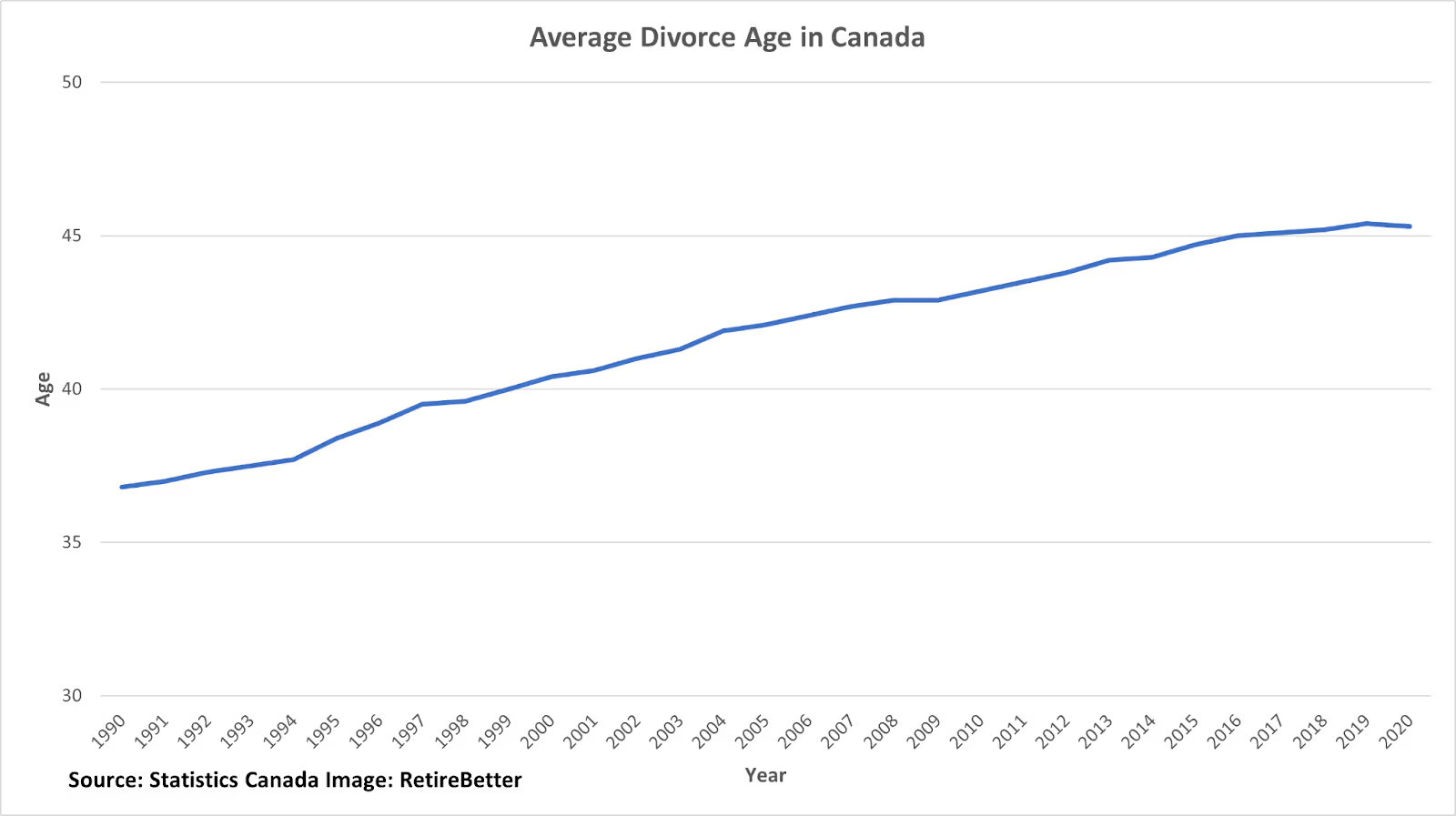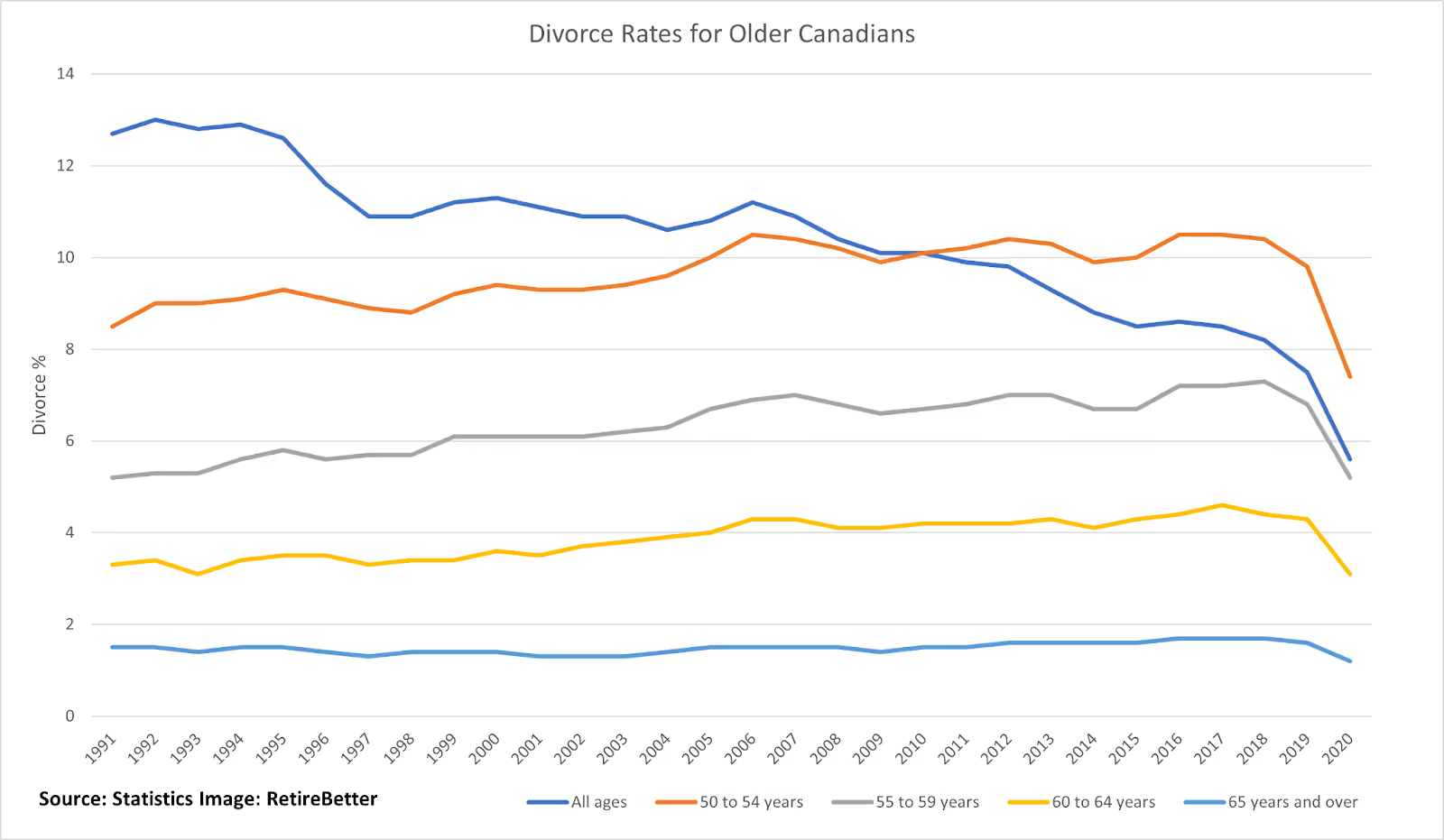Introduction
Divorce is never easy. Divorcing when you are older than 50 becomes even more difficult in some ways and, surprisingly, it’s not unusual.
In fact, divorce over the age of 50 has become so well known that it is now known as a “grey divorce”.
At RetireBetter, we're seeing clients come to us in this situation more frequently as well. In this article, we’ll go over how older Canadian homeowners can deal with their family home in a grey divorce.
Grey Divorce Statistics
Even though we have started to see more clients involved in a grey divorce, we were not sure if our situation was unique or could be supported by Canadian data.
Luckily we were able to find a lot of divorce data from Statistics Canada, that we were able to use in order to focus on couples getting divorced in their 50s, 60’s or 70s.
One interesting fact that jumped out to us was that people were getting divorced at an older age. This trend has been consistently happening since 1990, and the average age of a person getting divorced is now 45, compared to just under 37 in 1990.

Note: The average age of Canadian divorce may have peaked around 1990-2020 but the historical divorce numbers were all affected by COVID so we think it makes more sense to wait a few more years before making any conclusions about the long term trend changing.
We then checked out the specific age groups that Statistics Canada had broken the data into. Two things surprised us when we looked at this data:
- The divorce rate in Canada has been going down consistently since 1990. The divorce rate in 1990 was 12.7% and was 8.2% in 2018. It dropped even further during COVID and was 5.6% in 2020.
- The divorce rate for older Canadians has not followed the overall downward trend. The trend has remained constant and is increasing for some age groups!

While the divorce rates for Canadians between 50 to 65 or older are certainly lower than the national average, we can see they aren’t going down (except during COVID).
From this data, it seems that people who get a grey divorce are different from the younger groups who get divorced; they seem to be getting divorced for reasons that are different than their younger cohorts.
Reasons for Grey Divorce
We aren’t going to pretend that we are experts on the matter but it’s clear that there are a number of reasons why people get a grey divorce. Some of these reasons are:
- empty nest syndrome after the kids have moved out
- Growing apart or falling out of love
- Lack of intimacy
- Financial differences
- Less stigma with divorce
Regardless of the reason why people get divorced later in life, they will still need to deal with the universal issue of dealing with finances.
Financial Challenges in Grey Divorce
One of the most complicated parts of any grey divorce is going to be the separation of assets that have been collected over the years.
The potential aftershocks of any divorce can be significant on your existing retirement plans, savings and your financial future.
If you’re retired and receiving pension income, or about to retire, then these financial issues can become even more difficult to deal with.
Once a person reaches a later stage of life, it’s often not possible to keep working in order to financially recover from a divorce.
The Matrimonial Home Dilemma
With these unique financial issues that are facing older and retired seniors who are getting a divorce, addressing how the family home will be divided typically becomes the biggest issue.
For many people, the family home is not just a significant asset, but it also carries immense sentimental value.
Decisions about the home can become emotionally charged, but practically speaking, how can an older homeowner pay their partner who has agreed to give up the family home?
Perhaps there are enough savings to pay the spouse for their share of the family home but where that is not the case, a homeowner will normally need to borrow the money to pay their partner their equal share in the matrimonial home.
If the spouse keeping the home can qualify for a loan, the problem of paying out their partner can be solved.
Where a partner is retired though, or was a stay-at-home spouse and does not have any income, they likely will not be able to qualify for a loan. For these people, what are their options to keep the family home?
Are both people in a grey divorce going to be forced to sell their home and split the proceeds in order to divide their assets?
The Reverse Mortgage Solution for Grey Divorce
Here at RetireBetter, we offer a solution that can alleviate the financial challenge of a grey divorce: the reverse mortgage.
A reverse mortgage allows homeowners aged 55 and over to unlock up to 59% of their home's value in tax-free cash.
This option provides a financial cushion without the need to sell investments, hence preventing taxable events.
Learn more:
How Does a Reverse Mortgage Work?
The Best Way to Get a Reverse Mortgage
With a reverse mortgage, you could buy out your partner's share in the matrimonial home, ensuring you can stay in your home while providing them with their fair share.
Since there are no income requirements to qualify for a reverse mortgage, this solution can be particularly beneficial for those affected by a grey divorce.
RetireBetter Can Help in a Grey Divorce
Navigating a grey divorce in Canada requires professional financial and legal advice. It's crucial to seek guidance tailored to your specific situation. At RetireBetter, we understand that each divorce is unique and requires a personalized strategy.
We work with divorce professionals and can help you structure a reverse mortgage so you can come up with the necessary payment to buy out your spouse’s share in the family home.
Key Take-Aways
- The average age of Canadians getting a divorce has been increasing since 1990 and is now 45 according to Statistics Canada
- The divorce rate of Canadians aged +50 is lower yet more constant than the overall divorce rate which has been decreasing since 1990
- Older Canadians can use a reverse mortgage to help them buy out their partner’s share in the matrimonial home
Wrapping Up
Managing divorce can be complicated and emotionally draining but it’s not impossible to deal with.
At RetireBetter, we can help you arrange a reverse mortgage that will allow you to stay in your home without preserving your financial security in retirement.
Understanding your options is the first step towards a brighter tomorrow. So, don't hesitate to reach out to us for advice and support tailored to your unique situation.
FAQs
- Can a homeowner with bad credit and no income qualify for a reverse mortgage?
Unlike traditional mortgages, reverse mortgages do not focus on your credit score and your ability to make repayments. You do need to show enough income to make property tax payments on your home.
Learn More:
9 Loan Options for Seniors with Bad Credit
Can Seniors Get a Mortgage in Canada?
- Can I make payments on a reverse mortgage if I want to?
While you are not required to make monthly payments on a reverse mortgage, you can pay up to 10% of your loan amount every year. You can also make monthly payments of your interest charges if you wish.
- Can RetireBetter help me look at my mortgage and HELOC options as well as reverse mortgage options?
RetireBetter is a licensed mortgage brokerage and can provide you with various loan options other than reverse mortgages, including traditional mortgage and home equity lines of credit options.











